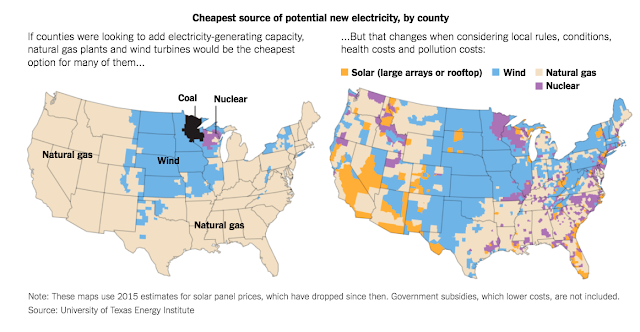This is the end of the effort at "clean coal", at least in the short term. Billions in cost overruns in an effort to get CO2 recapture (carbon capture and sequestration - CCS) to work. Reports from the MIT Technology Review and, originator of the story, the NY Times.
It costs much, much less ,and creates less CO2, if the project ... just keeps burning natural gas!
----------------------------------------
Update, July 2017 -- I just heard a podcast interview with Mark Jacobson of Stanford, one of the authors of a much-discussed 100% renewables scenario paper. His comment on CCS:
1. Takes 25% more energy to run the CCS project, so you burn a lot more coal than a normal project.
2. 1/3 of the pollution and CO2 associated with coal is "upstream" - mining, transport. That remains despite CCS. In fact, it increases by 25% since you need more coal!
3. CCS does not reduce the OTHER, awful pollutants associated with coal, which do not exist with renewables.
Since the March 11, 2011 disasters, energy policy in Japan has evolved rapidly. These issues are too important for discussion to be limited to a small group of bureaucrats and industry executives.
Friday, June 30, 2017
Monday, June 26, 2017
Coal India Closes 37 Mines
India transition away from coal faster than anticipated as solar gains quickly.
Saturday, June 24, 2017
Solar for off grid in Africa - No brainer!
Nice piece in the New Yorker about how solar is electrifying off-grid Africa.
We can debate how quickly and completely solar and wind will replace coal and gas in the developed world ... but there is no debate about its substantial role in the off-grid developing world. A lot is needed -- financing model, installation in remote areas -- but solar PV + storage has no serious competition in such roles.
"In 2009, a radio, a mobile-phone charger, and a solar system big enough to provide four hours of light and television a day would have cost a Kenyan a thousand dollars; now it’s three hundred and fifty dollars."
We can debate how quickly and completely solar and wind will replace coal and gas in the developed world ... but there is no debate about its substantial role in the off-grid developing world. A lot is needed -- financing model, installation in remote areas -- but solar PV + storage has no serious competition in such roles.
"In 2009, a radio, a mobile-phone charger, and a solar system big enough to provide four hours of light and television a day would have cost a Kenyan a thousand dollars; now it’s three hundred and fifty dollars."
Wednesday, June 21, 2017
Cheap Natural Gas, Wind and, increasingly, Solar, are Killing Coal, not Regulation
This NY Times opinion piece has a state-by-state look at the decline of coal, growth of gas, wind and solar, and why Trump's withdrawal from Paris is little more than a symbol within the U.S. The article focuses on the positive economic impact (or at least correlation) of clean energy and CO2 reduction.
This is another example of the NY Times using graphics effectively to drive home a point -- much more impact than with words. Co-authorship of the article is credited the "graphics director" of the NY Times opinion section, Stuart A. Thompson.
Snapshots of a few of the charts below -- but please go to the article to see how they really tell the story!
This is another example of the NY Times using graphics effectively to drive home a point -- much more impact than with words. Co-authorship of the article is credited the "graphics director" of the NY Times opinion section, Stuart A. Thompson.
Snapshots of a few of the charts below -- but please go to the article to see how they really tell the story!
This round to the NY Times.
Friday, June 16, 2017
Trump Cannot Bring Back Coal
It cannot be said often enough. Coal is not coming back in the U.S.
First cheap gas, now wind, and eventually solar, will taken it all the way to zero in coming years.
Here is an article from Bloomberg on the theme.
And Bloomberg does not even show solar "on the radar screen". That is changing very rapidly.
First cheap gas, now wind, and eventually solar, will taken it all the way to zero in coming years.
Here is an article from Bloomberg on the theme.
And Bloomberg does not even show solar "on the radar screen". That is changing very rapidly.
Tuesday, June 13, 2017
Decommissioning - big business ahead
A story in the WSJ today about the more than $100 billion of decommissioning work ahead to shut down many of Europe's aging nuclear plants. Each plant requires an average of around $1.5 billion, and often the plant designs do not offer any roadmap for disassembly.
Likewise, Japan has decades of work ahead. Can Japan get this done "on time and under budget", or will it drag out and increase in cost like most things nuclear energy-related? A crucial question.
Likewise, Japan has decades of work ahead. Can Japan get this done "on time and under budget", or will it drag out and increase in cost like most things nuclear energy-related? A crucial question.
Subscribe to:
Comments (Atom)




